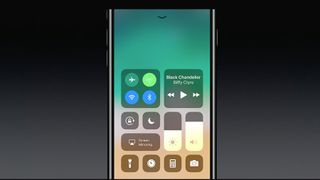iOS 11 vs iOS 10: what's new and what's cool
iOS 10 was good – but iOS 11 is far better

You can tell a lot about Apple by the mood of its keynotes, and WWDC 2017 was a doozy: there was so much to cover that Tim Cook didn’t even have time to show us graphs about how brilliant Apple is.
Instead we were pummelled with announcements, and the most important ones may well be the ones about iOS 11: after all, it’s the operating system of Apple’s future.
Since our first look at the OS there have been various betas and other big Apple news in the form of the iPhone X, iPhone 8 and iPhone 8 Plus, but now iOS 11 is finally available in finished form.
So... how much better is the new software than iOS 10?
iOS 11: release date
iOS 11 is available now. The final version was pushed out to iOS devices on September 19. If you don't have it yet you can manually check for updates from the Settings menu.
iOS 11 vs iOS 10: can you get it?
Bad news for old iPhones and iPads: the move to fully 64-bit computing in iOS 11 means that pre-Air iPads, the iPhone 5 and the iPhone 5C will be stuck on iOS 10 whether you want to upgrade or not.
Apps that haven’t been upgraded to 64-bit will no longer work on iOS 11, but developers have known about this for a couple of years, so it shouldn’t affect many of your favorites.
Get daily insight, inspiration and deals in your inbox
Sign up for breaking news, reviews, opinion, top tech deals, and more.
iOS 11 vs iOS 10: iPad
For all Tim Cook’s chat about loving the Mac, it’s clear that the future of personal Macs is iPad-shaped.
iOS 10 updated the Split View and Safari Split View that appeared in iOS 9, enabling something akin to multitasking. That’s been refined much further in iOS 11.
The Dock has room for many more apps and doubles as an app switcher, and you can now drag and drop from one window to another – so you might drop an iCloud or Dropbox document from the new Files app into Mail, or from a Safari page to a Pages document. The lines between iOS and macOS are getting awfully blurry.

The combination of iOS 10, the Apple Pencil and Markup on the iPad Pro opened up all kinds of possibilities for document creation and editing.
In iOS 11 that has been taken even further, with built-in document scanning and conversion, improved markup with inline drawings, and excellent handwriting recognition that enables you to search your scribbles.
You can also get writing faster, as you can now jot down notes straight from the lock screen.
There’s an improved keyboard too, which you can swipe to access numbers and punctuation instead of having to switch keyboard mode.
iOS 11 vs iOS 10: Siri
Siri in iOS 10 gained new powers: instead of being limited to Apple’s own apps, it was available to third-party app developers too.
That meant you could book an Uber or send a message by voice. That third-party API has been widened in iOS 11 to include note-taking apps, task management apps, QR codes and even online banking.
You’ve no doubt seen the HomePod, the Siri-powered rival to the Amazon Echo and Google Home. But there’s more to Siri in iOS 11 than a few more apps and a speaker.
The new, more realistic voices for Siri come with extra intelligence too, courtesy of machine learning technology – a phrase we heard quite a lot during the keynote.

Read about a holiday destination in Safari and Siri suggests it as a topic for you to follow in the news app, or as an autosuggestion in Messages.
Siri can translate between languages, and offers multiple results to queries. Siri learns what you’re interested in and how you use your device to better understand context, and that learning is shared (privately) across all your Apple devices.
iOS 11 vs iOS 10: Camera and Photos
iOS 10’s Photos app got a bold new design and some important new features, such as the ability to automatically categorize photos and recognize faces.
The Memories feature is particularly cool, automatically creating videos from photos, Live Photos and video clips based on an event or theme.
Photos in iOS 11 takes those features and refines them further. You can edit Live Photos to create perfect little loops or just change which frame is the still image, and you can add long-exposure effects to a Live View image – for example to blur water – with a single tap.
The Memories feature can identify key events such as weddings and sporting events, and can automatically find the best pictures and videos for each. It’ll also automatically reformat presentations if you rotate your device.

Apple has also addressed another key issue that plagues phones running iOS 10 at the moment: photo and video storage.
iOS 11 introduces two new file formats for video and photography respectively: HEVC for video and HEIF for images.
Both promise the same image quality in half the file size, and you’ll be able to export in formats that other platforms can understand.
Apple's also launched ARKit, its new platform for augmented reality apps – think Pokemon Go for everyday apps, and if developers embrace it that could mean a whole world of fun in future apps.
iOS 11 vs iOS 10: Control Center, HomeKit and Multi-Room Audio
In iOS 10 the Control Center became a multi-screen job with the standard controls on one card, HomeKit devices on another and music controls on a third. That’s changed significantly in iOS 11, with the entire Control Center fitting on a single screen.

Everything’s tappable, and 3D touch brings up further options and/or larger controls.
It’s a vast improvement on something that’s been bugging us for months, and it’s also good news for automated-home fans, who can benefit from iOS 11’s new AirPlay 2 protocol and multi-room audio.
Sonos is conspicuously absent from the list of partners so far, but we’re sure the brand will get on board eventually.
iOS 11 vs iOS 10: Maps
There weren’t many changes in iOS 9’s Maps app, but iOS 10 introduced a cleaner, clearer interface, live traffic information, zoom views for junctions and proactive notifications, which can suggest routes or destinations based on your interests.
Now iOS 11 adds the much-requested speed limits and lane guidance, as well as something really interesting: indoor maps. So far it's only for malls in eight cities and a few dozen airports, but Apple promises “hundreds more” to come.

If like us you find iOS 10 a little too chatty when you’re driving – do you really need that Tinder update or eBay dispatch notification? – you’ll like iOS 11’s new Do Not Disturb While Driving feature, which is designed to promote in-car safety.
As you’d expect it doesn’t disturb you when you’re driving, but you can configure it to send auto-replies or to let specific people through. It uses Bluetooth and/or Wi-Fi (using a Doppler Effect) to detect movement and prevent distractions.
iOS 11 vs iOS 10: Messages and Apple Pay
Messages got a major revamp in iOS 10: not just a new interface, but integrated third-party apps and stickers to make your messages pop or annoy the boss.
It looks much the same in iOS 11, but the app drawer has been redesigned for clarity, and the available apps now include Apple Pay.
That means you can send or request money from friends without leaving the Messages app, and if you’re requesting cash it’ll even fill in the amount for you.
Incoming funds are stored on your Apple Pay cash card and can be spent normally or withdrawn to your bank.

With iOS 10, your messages are stored on the device you’re using – and that means you’ll often get notifications on one device of messages you’ve already seen on another.
Not in iOS 11. Its messages are stored in and synced via the cloud, so not only will you no longer get out of date notifications, but you’ll free up lots of storage space too.
iOS 11 vs iOS 10: Apple Music and the App Store
Good news, everybody! Ping is back! Well, kinda… Apple Music in iOS 11 hasn’t changed the (in our opinion, really confusing) interface it adopted in iOS 10, but it does now get better discovery in the form of Spotify-style playlists of your friends’ music.
There’s also a new MusicKit API for third-party apps to access your Apple Music account, and a completely redesigned App Store to make it easier to find cool and useful new apps.
Writer, broadcaster, musician and kitchen gadget obsessive Carrie Marshall has been writing about tech since 1998, contributing sage advice and odd opinions to all kinds of magazines and websites as well as writing more than a dozen books. Her memoir, Carrie Kills A Man, is on sale now and her next book, about pop music, is out in 2025. She is the singer in Glaswegian rock band Unquiet Mind.
Most Popular

